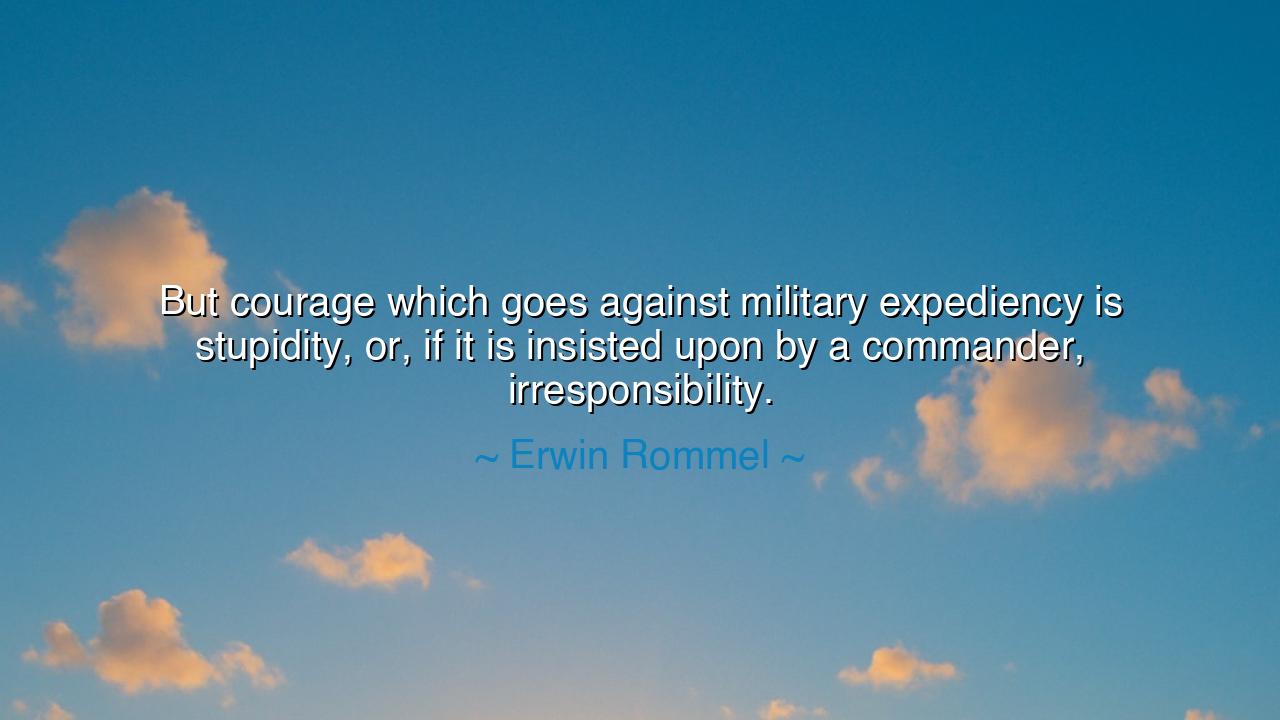
But courage which goes against military expediency is stupidity
But courage which goes against military expediency is stupidity, or, if it is insisted upon by a commander, irresponsibility.






Hear now the iron-bound wisdom of Erwin Rommel, the “Desert Fox,” a soldier of legend whose name was spoken with both fear and admiration. In the crucible of war, where life and death balance upon a moment’s decision, he declared: “But courage which goes against military expediency is stupidity, or, if it is insisted upon by a commander, irresponsibility.” In these words, Rommel separates true courage from reckless pride. He reminds us that valor without wisdom becomes folly—that the highest form of bravery is not in blind defiance, but in disciplined purpose.
Rommel’s words were forged amid the burning sands of North Africa during the Second World War, where he commanded with brilliance and honor. He saw men willing to die for glory, for duty, for the thrill of combat—but he also saw how many of those deaths were wasted when untempered by strategy. He understood that in war, courage must serve reason, not vanity. The soldier who charges without purpose, who acts from impulse rather than judgment, may appear heroic for a moment, yet he endangers his comrades and his cause. The true warrior, Rommel teaches, acts not for display, but for victory—and victory requires not only heart, but mind.
The ancients, too, spoke of this harmony between valor and wisdom. Aristotle wrote that courage is the mean between cowardice and rashness—too little courage brings disgrace, too much leads to ruin. Rommel’s teaching echoes this same eternal truth: that unrestrained bravery can destroy what it seeks to defend. The wise commander knows that courage must be guided by prudence, as fire must be contained by the hearth if it is to warm rather than consume. To act without regard for consequence is not noble—it is a betrayal of those who depend on your strength.
Consider the story of General George Custer, whose name became synonymous with reckless valor. At the Battle of the Little Bighorn, he led his men into hopeless combat against overwhelming odds, believing courage alone could defy fate. The result was disaster—his army annihilated, his men slain to the last. His was not courage, but stupidity, as Rommel would have said: bravery divorced from strategy, pride mistaken for leadership. Custer sought personal glory, but he lost everything. His tale stands as a warning through the ages: courage ungoverned by wisdom leads not to honor, but to ruin.
Rommel, in contrast, embodied the disciplined courage of the strategist. He led from the front, shared the dangers of his men, and inspired them through example. Yet his boldness was never reckless; his maneuvers, though daring, were grounded in calculation. He knew when to advance and when to withdraw, when to fight and when to wait. For him, courage was not the act of ignoring fear, but the mastery of it—the channeling of human spirit toward a higher goal. Thus, when he spoke of military expediency, he meant that courage must always serve a greater plan, never one’s ego or impulse.
But Rommel’s wisdom reaches beyond the battlefield. In every field of life—whether in leadership, work, or personal struggle—there are those who mistake stubbornness for courage, who persist in folly merely to appear brave. The man who refuses to listen to reason, who sacrifices others to preserve his pride, is no hero. True courage requires humility, the ability to adapt, and the willingness to act not for self-glory, but for the good of all. To be courageous is not to charge ahead blindly, but to act decisively and wisely, even when fear whispers and doubt clouds the mind.
Therefore, O listener, take this lesson as a torch for your own journey: let your courage be guided by thought, your bravery balanced by wisdom. Do not confuse defiance with strength, nor obstinacy with honor. The truly brave are those who act with clarity of purpose, who temper fire with reason and passion with discipline. In battle or in life, victory belongs not to the loudest or boldest, but to the steadfast—the one who knows when to fight, and when to hold the line.
For as Rommel knew, courage without wisdom is destruction, and wisdom without courage is paralysis. But when the two walk together, they forge greatness. So arm your heart with bravery, but let your mind hold the reins. In this balance lies not only the secret of a soldier’s triumph—but the path to every victory worth achieving in life.






AAdministratorAdministrator
Welcome, honored guests. Please leave a comment, we will respond soon